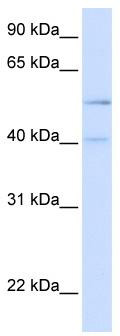ATG4B Rabbit Polyclonal Antibody
Frequently bought together (3)
Recombinant protein of human ATG4 autophagy related 4 homolog B (S. cerevisiae) (ATG4B), transcript variant 1
USD 823.00
Transient overexpression lysate of ATG4 autophagy related 4 homolog B (S. cerevisiae) (ATG4B), transcript variant 1
USD 396.00
Other products for "ATG4B"
Specifications
| Product Data | |
| Applications | WB |
| Recommended Dilution | WB |
| Reactivities | Human |
| Host | Rabbit |
| Isotype | IgG |
| Clonality | Polyclonal |
| Immunogen | The immunogen for anti-ATG4B antibody: synthetic peptide directed towards the N terminal of human ATG4B. Synthetic peptide located within the following region: WGCMLRCGQMIFAQALVCRHLGRDWRWTQRKRQPDSYFSVLNAFIDRKDS |
| Formulation | Liquid. Purified antibody supplied in 1x PBS buffer with 0.09% (w/v) sodium azide and 2% sucrose. Note that this product is shipped as lyophilized powder to China customers. |
| Purification | Affinity Purified |
| Conjugation | Unconjugated |
| Storage | Store at -20°C as received. |
| Stability | Stable for 12 months from date of receipt. |
| Predicted Protein Size | 44 kDa |
| Gene Name | autophagy related 4B cysteine peptidase |
| Database Link | |
| Background | Autophagy is the process by which endogenous proteins and damaged organelles are destroyed intracellularly. Autophagy is postulated to be essential for cell homeostasis and cell remodeling during differentiation, metamorphosis, non-apoptotic cell death, and aging. Reduced levels of autophagy have been described in some malignant tumors, and a role for autophagy in controlling the unregulated cell growth linked to cancer has been proposed. ATG4B is a member of the autophagin protein family, it is also designated as a member of the C-54 family of cysteine proteases. Alternate transcriptional splice variants, encoding different isoforms, have been characterized.Autophagy is the process by which endogenous proteins and damaged organelles are destroyed intracellularly. Autophagy is postulated to be essential for cell homeostasis and cell remodeling during differentiation, metamorphosis, non-apoptotic cell death, and aging. Reduced levels of autophagy have been described in some malignant tumors, and a role for autophagy in controlling the unregulated cell growth linked to cancer has been proposed. This gene encodes a member of the autophagin protein family. The encoded protein is also designated as a member of the C-54 family of cysteine proteases. Alternate transcriptional splice variants, encoding different isoforms, have been characterized. |
| Synonyms | APG4B; AUTL1 |
| Note | Immunogen Sequence Homology: Pig: 100%; Rat: 100%; Human: 100%; Guinea pig: 100%; Dog: 93%; Mouse: 93%; Bovine: 92%; Rabbit: 85% |
| Reference Data | |
| Protein Families | Protease |
| Protein Pathways | Regulation of autophagy |
Documents
| Product Manuals |
| FAQs |
| SDS |
{0} Product Review(s)
0 Product Review(s)
Submit review
Be the first one to submit a review
Product Citations
*Delivery time may vary from web posted schedule. Occasional delays may occur due to unforeseen
complexities in the preparation of your product. International customers may expect an additional 1-2 weeks
in shipping.






























































































































































































































































 Germany
Germany
 Japan
Japan
 United Kingdom
United Kingdom
 China
China



